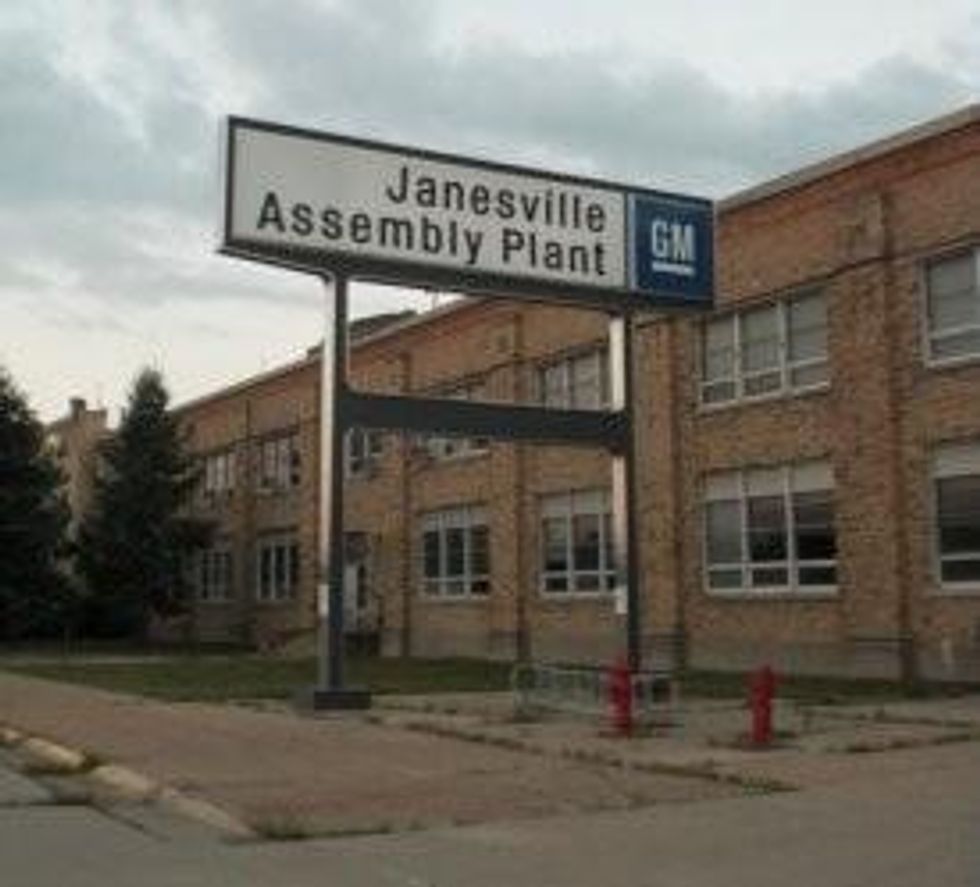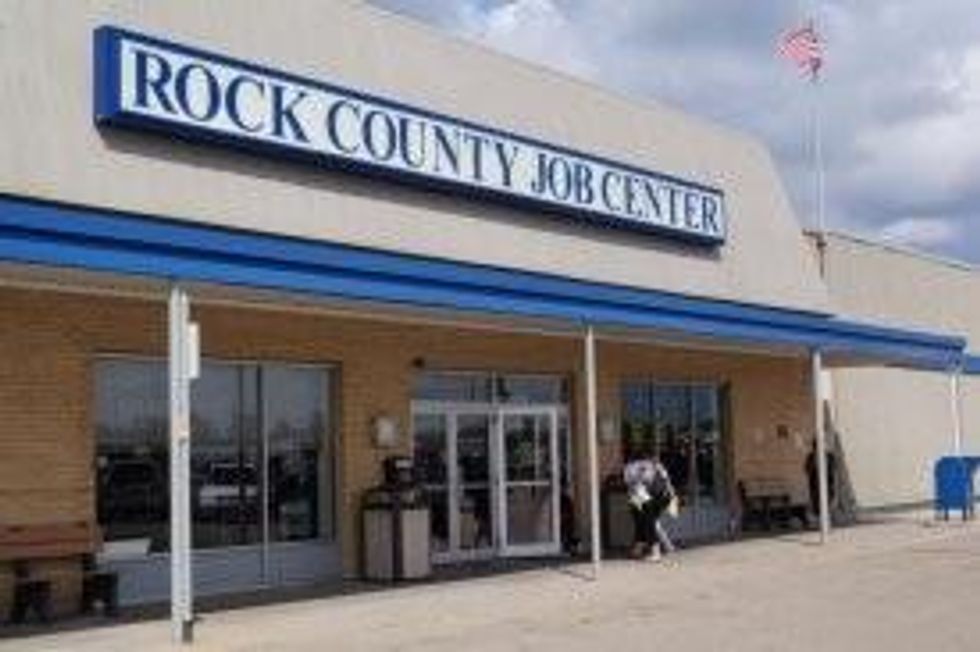When Dave Schumacher, 51 years old, lost his job in 2009 in U.S. Rep. Paul Ryan's hometown of Janesville, Wisconsin, he wasn't alone. Schumacher drove trucks for a supplier company that served the General Motors SUV plant, the economic heartbeat of this blue-collar town. GM consolidated production in Texas and Mexico.
When the four-million-square-foot GM plant on the Southern part of town closed in 2009 after a series of layoffs, it took with it the jobs of some 2,800 employees, the single most significant economic blow inflicted upon any Wisconsin community since the economic collapse of 2008. But it wasn't just GM workers who lost their jobs, the closure caused a ripple effect of business closings and layoffs in the area, leaving an ill-equipped safety net supporting the workers who remained in the community.
After he lost his job, Schumacher began making calls so that he could begin receiving unemployment benefits and training, but for two months he was unable to get a person on the line. He turned to Ryan for help. While visiting the Congressman's office, Ryan told him he would receive a call. Schumacher warned Ryan that he would come back to his office every day until he received help, but an hour after he left, he got a call from the unemployment office.
Since then, Schumacher like others in Ryan's district, has faced hurdle after hurdle in finding employment and training, most significantly a stubborn unemployment rate in Rock County -- the rate has hovered around 9 percent, after a peak of 13.9 percent after the plant closing.
While Ryan did connect him with the unemployment benefit office, Schumacher is not impressed with the Congressman.
"Is it my fault the Republicans let the economy go to shit? No," he said. Schumacher largely blames Republicans for their role in the global financial meltdown which has hit Janesville hard. Ryan voted along with the majority of both political parties for the repeal of Glass-Steagall in 1999, which created the "too big to fail" institutions that played a critical role in collapsing the economy and the subsequent bailout (also supported by Ryan). Ryan has also been a supporter of every free trade deal to cross his desk including the 2000 China free trade deal that has cost Wisconsin some 56,900 of jobs and the 2005 Central American Free Trade Deal (a NAFTA expansion to the region).
According to Schumacher, those who pushed damaging economic policies have an added responsibility to help him pick up the pieces and aid him in finding "a job that I can support my family on."
Unemployment Benefits Keep Janesville Afloat
After the GM closing and the closing of another auto plant in Ryan's district in 2010 (Kenosha Engine which displaced another 800 highly paid auto workers), families and communities were kept afloat by unemployment benefits. While Ryan supported the $800 million TARP bailout for big banks and convinced others in his party to swallow the bitter pill and vote for TARP, he has been less supportive of programs to help the unemployed.
Ryan has called the social safety net "a hammock that ends up lulling people in their lives into dependency and complacency" and has a history of voting against extending unemployment benefits. Some Janesville residents argue that statements like these, coupled with his voting record, illustrate a disconnect between Ryan and the community he represents.
Bert Weeks, a 59-year-old former veteran and great-grandfather of nine, agrees with Ryan on most things, but not on the value of unemployment benefits. Week's stepdaughter had depended on unemployment checks in the past, and it was crucial for her to get through a rough patch in life, he told the Center for Media and Democracy while standing outside the Rock County Jobs Center.
"Maybe some people might take advantage of these benefits, but for most people on them they are making about one-third of what they use to make in the past. That's no way to live. That ain't security," he said.
Another Janesville resident, Karina Glowacki, a 20 year-old who works as a shift leader at a local Taco Bell also parts ways with Ryan when it comes to issues like unemployment benefits. Glowacki at one point in her life was depending on unemployment benefits and said it was crucial in helping her secure housing and her ability to feed herself.
"While this community is still struggling from the plant closings, we would have been a lot worse if it weren't for unemployment benefits," she said.
Even the GM workers who stayed in the Janesville area and found work are making a fraction of what they used to make at the high-wage United Auto Workers (UAW) plant.
Don Heritage, a former GM employee, is making half of his former pay working 3rd shift as maintenance for a candy company -- a job which took him two years to find. Heritage views Ryan as "anti-union" and said, "Ryan, as far as I know, is not welcome at the GM plant or any factory."
According to Heritage, "He's not for the working person, the blue collar, he's for the upper bunch." This is an argument that was also made by others who point to his proposed federal budget which would preserve the Bush tax cuts for high-income households and cut taxes for the wealthy and shift more of the tax burden onto middle class families.
Ryan Does Little to Aid the Recovery
While Ryan voted for the $800 billion TARP bank bailout, he voted against President Obama's $800 billion economic stimulus bill. Ryan supported TARP and his floor statements painted a picture of impending doom for the financial sector. Yet on the day of the vote on a stimulus plan to stop catastrophic job loss Ryan said "this is not a crisis we can spend and borrow our way out of." Ryan continues to aggressively campaign against the stimulus bill characterizing it as a "wasteful spending spree."
Yet if there are any "green shoots" in Janesville today, it is because of federal support for this hard-hit region. The feds have several economic development projects underway. These include the "Janesville Innovation Center," a business incubator project providing commercial space to private employers and funding for a new manufacturing plant for a "medical tracer," a device that detects heart disease and tracks the progression of cancer formerly produced outside the United States.
According to Victor Grassman, Janesville's Director of Economic Development, Ryan has not been helpful in securing federal aid.
"Since GM left, Paul Ryan doesn't do earmarks any more. He's really only functioning at the national level. If you need help with Social Security, or something like that [his staff] responds. But he doesn't do earmarks to bring it back home to Janesville and Rock County," he said.
"We've been supporting workers and laid off folks from General Motors. We received some federal funds, but there is still obviously a lot of distress," he said. "We've just received an economic development administration grant, but that came through the Obama contingent. We received $1.2 million for business incubator, clearly through President Obama's staff. [We apply through] the EPA, and other departments and we were granted some additional assistance by the federal government. We didn't ask for [Ryan's] help because we didn't expect anything to happen if we went through that route."
Ed Sadlowski, staff representative for AFSCME Local 40, largely represents constituents in Ryan's district. "I have one question for people. Ask yourself, in this district, are you better off than you were 14 years ago? Do you have more rights? Has your standard or living improved? He's been your representative in the Federal Government for 14 years, what has he been doing for 14 years?"
Ryan's Parker Pen Mansion, Remnant of a Different Era
For over 120 years, one of Janesville's great prides was the Parker Pen Company. Founded by George Parker in 1888, Parker Pen became the largest manufacturer of high-quality pens in the world and supplied pens to Congress and the White House for bill signings.
In 2009, the Janesville plant succumbed to wage pressure from the global trade agreements Ryan was so fond of. 150 workers lost their jobs when manufacturing and distribution operations were moved to Mexicali, Mexico.
In 2010, Ryan and his wife purchased the 5,786 square foot "Parker Mansion," and are raising their family in the remnants of a more prosperous age.
Down the road from the Mansion Hill district where Ryan lives, the formerly vibrant downtown of Janesville is a hollowed-out shell of its old self. Unemployment benefits have ended and there are too few new jobs to give job seekers hope.
*********
CMD's Mary Bottari, Harriet Rowan and Jonathan Rosenblum contributed to this article.


